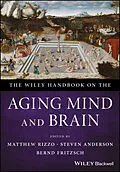A thought-provoking treatise on understanding and treating the aging mind and brain
This handbook recognizes the critical issues surrounding mind and brain health by tackling overarching and pragmatic needs so as to better understand these multifaceted issues. This includes summarizing and synthesizing critical evidence, approaches, and strategies from multidisciplinary research--all of which have advanced our understanding of the neural substrates of attention, perception, memory, language, decision-making, motor behavior, social cognition, emotion, and other mental functions.
Written by a plethora of health experts from around the world, The Wiley Handbook on the Aging Mind and Brain offers in-depth contributions in 7 sections: Introduction; Methods of Assessment; Brain Functions and Behavior across the Lifespan; Cognition, Behavior and Disease; Optimizing Brain Function in Health and Disease; Forensics, Competence, Legal, Ethics and Policy Issues; and Conclusion and New Directions.
* Geared toward improving the recognition, diagnosis, and treatment of many brain-based disorders that occur in older adults and that cause disability and death
* Seeks to advance the care of patients who have perceptual, cognitive, language, memory, emotional, and many other behavioral symptoms associated with these disorders
* Addresses principles and practice relevant to challenges posed by the US National Academy of Sciences and National Institute of Aging (NIA)
* Presents materials at a scientific level that is appropriate for a wide variety of providers
The Wiley Handbook on the Aging Mind and Brain is an important text for neurologists, psychiatrists, psychologists, physiatrists, geriatricians, nurses, pharmacists, social workers, and other primary caregivers who care for patients in routine and specialty practices as well as students, interns, residents, and fellows.
Autorentext
Matthew Rizzo is the Frances and Edgar Reynolds Professor and Chair of the Department of Neurological Sciences and Chief Physician for Neuroscience Clinical Programs at the University of Nebraska Medical Center.
Steven Anderson is Associate Professor in the Department of Neurology and the Interdisciplinary Graduate Program of Neuroscience at the University of Iowa.
Bernd Fritzsch is an Entrepreneurial Professor at the University of Iowa. He is also Director of the Center on Aging and Director of the Aging Mind and Brain Initiative.
Inhalt
List of Contributors viii
Acknowledgments xii
List of Abbreviations xiv
Glossary xx
Part I Introduction 1
1 The Aging Mind and Brain: Overview 3
Matthew Rizzo, Steven Anderson, and Bernd Fritzsch
Part II Theoretical, Animal Models, Social, and Humanistic Perspectives 17
2 Social Networks, Social Relationships, and Their Effects on the Aging Mind and Brain 19
Sato Ashida and Ellen J. Schafer
3 Aging and the Brain 37
Veena Prahlad and Madhusudana Rao Chikka
4 Animal Models of Pathological Aging 61
Eric B. Emmons, Youngcho Kim, and Nandakumar S. Narayanan
5 Humanistic Perspectives: Arts and the Aging Mind 78
Andrea Charise and Margaret L. Eginton
Part III Methods of Assessment 101
6 Medical Assessment of the Aging Mind and Brain 103
T. Scott Diesing and Matthew Rizzo
7 Neuropsychological Assessment of Aging Individuals 130
R. D. Jones
8 Normal Aging: Brain Morphologic, Chemical and Physiologic Changes Detected within vivo MRI 146
A. A. Capizzano, T. Moritani, M. Jacob, and David E. Warren
9 Positron Emission Tomography (PET) Imaging: Principles and Potential Role in Understanding Brain Function 164
Laura L. Boles Ponto
10 Electrophysiological Measures of Age-Related Cognitive Impairment In Humans 188
David E. Anderson and Olga Taraschenko
11 The Brain in the Wild: Tracking Human Behavior in Naturalistic Settings 204
Gabriella E. M. Rizzo and Matthew Rizzo
12 Quality of Life Assessment 223
Fredric D. Wolinsky and Elena M. Andresen
Part IV Brain Functions and Behavior Across the Lifespan 253
13 Executive Functions and Behavior Across the Lifespan 255
Paul J. Eslinger and Claire Flaherty
14 Memory and Language in Aging: How Their Shared Cognitive Processes, Neural Correlates, and Supporting Mechanisms Change with Age 270
David E. Warren, Rachael Rubin, Samantha Shune, and Melissa C. Duff
15 Vision and Aging 296
Cynthia Owsley, Deepta Ghate, and Sachin Kedar
16 Aging-Related Balance Impairment and Hearing Loss 315
Deema Fattal, Marlan Hansen, and Bernd Fritzsch
17 Attention and Processing Speed 337
Benjamin D. Lester, Daniel B. Vatterott, and Shaun P. Vecera
18 Motor Functions and Mobility 362
Warren G. Darling, Kelly J. Cole, and James A. Ashton-Miller
19 Incontinence and Sexual Dysfunction 389
Karl J. Kreder, Sarah Fraumann Faris, Matthew Rizzo, and Satish S-C. Rao
20 Emotional Function During Aging 417
Kuan-Hua Chen and Steven W. Anderson
Part V Brain Disease and Dysfunction 445
21 Alzheimer's Disease and Mild Cognitive Impairment 447
David T. Jones, Marla B. Bruns, and Ronald C. Petersen
22 Cerebrovascular Disease and White Matter Disorders 483
Nandakumar Nagaraja and Enrique C. Leira
23 Movement Disorders 523
Dronacharya Lamichhane and Ergun Y. Uc
24 Psychiatric Disorders 541
Steven P. Wengel, Roberto F. Cervantes, and William J. Burke
25 Encephalopathy 553
Alberto Serrano-Pozo
26 Traumatic Brain Injury and Neurodegenerative Disease 591
Dawn McGuire
27 Sleep and Sleep Disorders in Older Adults 619
Jon Tippin
28 PAIN 628
Keela Herr, Stephen Gibson, and Thomas Hadjistavropoulos
Part VI Optimizing Brain Function in Health and Disease 649
29 The Benefits of Physical Activity on Brain Structure and Function in Healthy Aging and Age-Related Neurological Disease 651
Michelle W. Voss
30 Aging, Mind and Brain: A Hu...
